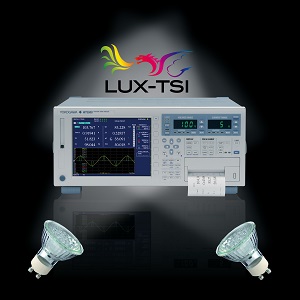Yokogawa power meters and analysers are the key elements in tests being carried out by LUX-TSI: an independent UK test house specialising in the testing of energy efficient lighting and electronic products, including LEDs, to ensure compatibility with international standards governing energy efficiency.

The two companies have entered into a relationship to test products using Yokogawa’s WT210 and WT3000 instruments to evaluate compliance with European Ecodesign (ErP) Directives, and this capability will be demonstrated at the euroLED Conference at the International Convention Centre, Birmingham, on 24th and 25th June 2013. At this event, LUX-TSI will also be exhibiting with its partner, UL, who are global players in the provision of energy performance and safety testing and certification.
The Yokogawa WT3000 precision power analyser provides “best in class” precision and stability. With a basic power accuracy of ±0.02% of reading, DC and 0.1 Hz-1 MHz measurement bandwidth, and up to four input elements, the WT3000 provides a high-accuracy measurement solution for testing all types of power electronics products.
Dr. Gareth Jones, Chief Executive of LUX-TSI, is a keen supporter of the EU Ecodesign Directive in helping to reduce greenhouse emissions: “The European Commission has brought into effect regulations and directives focused on improving the energy efficiency of key products”, he comments: “There are two complementary ways of reducing the energy consumed by these products: imposing requirements at the design phase, and adding labelling to raise the awareness of consumers. Our UK based independent accredited test house is supporting the implementation of this directive through providing energy performance testing to industry and Government.”
It is estimated that over 80% of all product-related environmental impacts are determined during the design phase. Product energy-efficiency improvement is a highly effective mechanism to achieve carbon emission reductions, both in terms of the short payback period and the change that may be affected. Research has shown that the introduction of more energy-efficient electronics and lighting represents the lowest cost to society per ton of CO2 emissions reduced.
Lighting products are an important part of the energy-using product space, and consume around 20% of electricity usage. The production, distribution, use and end-of-life management of lighting products are associated with important environmental impacts such as waste generation and the release of hazardous substances.
“One effect of new regulations has been a phasing out of most of the inefficient incandescent light bulbs available for sale in the EU”, says Dr. Jones: “This is driving an important new product into the lighting world – the solid-state LED light - which creates benefits in terms of lowering energy: not only in its growing use but also the energy consumed in manufacturing the product, which is much lower than for other lighting technologies.”
Current estimates suggest that LEDs will achieve more than 70% market penetration by 2020, displacing traditional technologies that have existed for 100 years within a very short timescale.
Testing lighting and electrical products according to the regulations is technically complex and requires controlled laboratory conditions, with stringent calibration and operating procedures. “This is where the LUX-TSI independent accredited testing laboratory with its Yokogawa power measuring instruments has a key role to play”, says Dr. Gareth Jones: “We are happy to fulfil this requirement by supporting manufacturers and governments to ensure that the product performance complies with the regulations in use and in the design phase.”
For further information about the WT210 and WT3000 visit https://cdn.tmi.yokogawa.com/files/uploaded/bu7600_00e_020_1.pdf